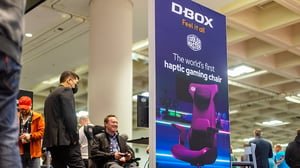Why did D-BOX decide to get into the gaming sector?
D-BOX established its gaming division in late 2019 after having seen great success in enhancing the sim racing experience.
At first, we attended gaming tradeshow events in Canada that allowed us to establish contacts at many Montreal-based companies such as Ubisoft. We also worked closely with Codemasters—the developer of the extremely popular F1 racing games—prior to their acquisition by Electronic Arts (EA) in 2021.
These early initiatives in the gaming sector allowed us to get a large amount of positive feedback from our existing business partners. When you combined that feedback with the fact that gaming was such a fast-growing market, we decided to go all-in.
What other gaming events has D-BOX attended?
Pre-pandemic, we attended gaming events such as E3, PAX, Dreamhack and a few others. After the pandemic we started to attend attend the Game Developer’s Conference as well as the renowned Consumer Electronics Show (CES) that takes place annually in Las Vegas!
As a matter of fact, it was at the 2023 CES earlier this year that we demonstrated a fully functional prototype of our haptic gaming seat built in collaboration with Cooler Master. The seat combines Cooler Master’s industry know-how and D-BOX’s proprietary haptic technology, making it compatible with our new Adaptive Gaming Mode.
What’s the difference between the D-BOX Adaptive Gaming Mode, Adaptive Audio Mode and a D-BOX coded game?
A D-BOX coded game provides the best haptic experience (through a unique combination of hand-coded effects consisting of movements, vibrations and textures) since it best reflects the exact desired experience of the game as imagined by its Creative Director. With D-BOX coded games, a D-BOX haptic developer like myself works alongside the game developers and studios to ensure that the experience is as close to physically being in the game as can be.
Adaptive Gaming Mode, on the other hand, allows gamers to create their own game profiles in the D-BOX Game Center, which means that their haptic system will provide them with feedback for literally any PC game based solely on actions that they trigger through their keyboard, mouse, or controller. In Adaptive Gaming Mode, users decide which action will trigger which haptic sequence, and they can also share their profiles with the D-BOX community!
D-BOX haptic developers also create profiles for the most popular games, ensuring that the haptic effects you feel will be extra precise and immersive-- allowing you to live the best experience possible.
Finally, if you prefer to try a different type of haptic experience that's based on sound rather than in-game actions, then Adaptive Audio Mode is the mode for you! Adaptive Audio Mode allows gamers to experience textures and vibrations (no movement) based on the game’s audio, which means that as opposed to feeling your character jump, you'll feel the ground shake from the explosion that went off behind you, you'll feel the click-clack-click-clack of your horse galloping and you'll be able to tell which car you're driving based purely on the engine vibrations! These ambient noises and their accompanying vibrations and textures help immerse you into the game's environment and provide you with a unique gaming experience. However, the best haptic experience will always be with coded games.
Who are your partners in the gaming industry?
As mentioned before, Ubisoft was one of our early partners. They worked with us to create a coded experience for the premium game Assassin’s Creed Valhalla! Codemasters (and EA) also still work closely with us for all F1 racing games.
We’ve also partnered with Microsoft to produce a coded experience for all the games in the Forza Horizon series.
As a whole, we’ve hand-coded nearly 100 games—mostly for racing and flight simulation. Users can find these titles in our content catalogue!
We’re also currently working alongside gaming peripheral companies such as Cooler Master.
What types of gaming companies are you looking to work with?
In short, we’re looking to work with software game developers or studio publishers who are looking to add a unique and innovative feature; who want to enhance the gaming experience with haptics.
As two companies working to enhance the gaming experience, it was natural for us to partner with D-BOX to code Assassin's Creed ® Valhalla. We're always on the lookout for innovative companies who work to further immerse players in their game, and D-BOX does just that for our game!
- Rose-Marie Nargaud, Associate Director, Global Business Development & Tech Partnerships at Ubisoft
We’re also looking to work with hardware and peripheral manufacturers who would be interested in adding our haptic actuators to their products, as well as brand companies who believe in immersive strategies to extend their brand resonance!
What kind of feedback have you received from potential partners?
The majority of our potential partners are extremely open to haptic technology as they see it brings something new and innovative to the table. Plus, since almost every game already has haptic feedback programmed into the controller, most creative teams are already familiar with our concept!
Overall, our high-fidelity haptic technology is very well received by potential partners who understand that it adds an extra layer of fun and immersion for users.
What types of games or genre of games go well with D-BOX haptics?
That’s the beauty of it—D-BOX haptics can be applied to any game!
We use the same motion and sensory programming and the same queuing that helps us to create ambience in movies. For an example of ambience in a game, think of what it would feel like to be in the land of Hyrule in Zelda—the haptic feedback and ambience immerses you in the game’s environment.
Action games and action movies are natural for D-BOX to code. Same thing for horror and jump-scare type movies and games—the haptics make them come alive!
However, there are a lot of games that are quite passive and relaxing, and we’re great at adding effects like tension and tingling to slow-moving genres as well.
Come meet D-BOX at Gamescom 2023
If you want to learn more about how D-BOX uses haptic technology to immerse gamers into their games, then feel free to come see us at booth 040g/041g, Investissement de Québec, in hall 3.2 of Gamescom. We'd love to show you how you can enhance the gaming experience for your clients, give you the rare opportunity to experience the magic of Motion 1, and why haptic technology will be in the industry for decades to come!




